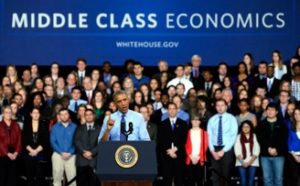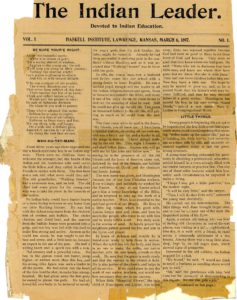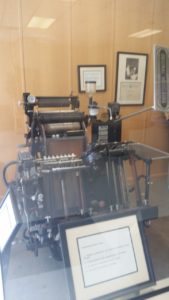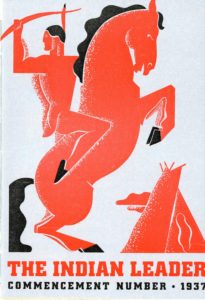The world’s oldest Native American-run student newspaper, and Haskell’s own, The Indian Leader, will be celebrating 120 years of publication this year.
In addition to providing information about events happening on and around Haskell, students reporting for The Indian Leader have had the opportunity to report on news of national and international importance. Charlie Perry, former Editor in chief until his graduation from Haskell in 2015, relayed his excitement at being present on-stage while President Barack Obama delivered his “Middle Class Economics” speech at the University of Kansas in 2015.
While The Indian Leader is the world’s oldest operational Native American school newspaper, it does not seem to have been the first. Carlisle Indian School in Carlisle, Pennsylvania, holds that distinction having had their own newspaper The School News as early as 1882; three years after that school’s establishment and two years before Haskell Institute opened its doors.
The first edition of Haskell Institute’s school newspaper, The Indian Leader, was published on March 6, 1897. Although it is not clear how actively students were involved in the newspaper’s earliest content, students from the school’s printing department were responsible for its printing from the very beginning. Today, however, the paper is printed off-site. The Indian Leader’s content has changed greatly over the years and serves as a clear reflection of the attitudes and environment of Haskell over the decades. The earliest editions contain content lauding the success of re-education of American Indian students and the “civilizing” effect that boarding schools had, an attitude that carries over into the first years of the 20th century. But, by the year 1915 this had all changed and the newspaper focused more heavily on providing insight into global current events; social news regarding the school’s staff, faculty, students, and alumni; sports reporting concerning the school’s athletic teams; club and literary groups’ news; as well the general happenings around Haskell and within the United States Government.
In the 1930s this high standard of reporting continued when the school’s first Native American Superintendent, the Yale-educated Dr. Henry Roe Cloud, installed himself as the newspaper’s editor-in-chief. While Roe Cloud’s editorials focus primarily on his work outside of Haskell, their relevance to the lives of Haskell students and their families is evident. Roe Cloud went to great lengths to describe what he had envisioned for the Indian Reorganization Act, commonly known as the “Indian New Deal” of 1934, and provided instructions to students on how to explain this legislation to their families.
These early decades of The Indian Leader are particularly interesting for anyone wishing to study the history of the school more in-depth as these years provided information about Haskell graduates as well as employees who had moved on. Many issues feature news of weddings, engagements, and birth announcements as well as obituaries of individuals whose lives had been impacted by Haskell. These issues serve as a prominent reminder of the level of involvement towards, as well as loyalty to, Haskell that was so prevalent amongst the graduates of the school’s early years. (These issues are available to researchers on microfiche at Tommaney Library during regular operating hours.)
During the war years of the 1940s, The Indian Leader staff, the same as with many American newspapers, followed the example set by their predecessors during the years of the First World War, and kept the Haskell community up to date on the happenings of the war. News of general interest around the school, focusing on the activities of clubs and athletics as well as the school’s various departments rounded out the content enabling The Indian Leader staff to produce an informative and well-written newspaper.
Later into the 20th century the newspaper’s content began to shift away from governmental news and stories about the doings of graduates and former instructors and focused more in-depth on the activities of the school’s various departments, events around campus and within the City of Lawrence.
In 1989 The Indian Leader made national headlines when students of Haskell Indian Junior College filed a lawsuit citing censorship and denial of the students’ first amendment rights when a faculty member and his son, who was not a Haskell student, attempted to publish an issue of the newspaper without receiving proper input from the newspaper staff. In addition to these actions, the newspaper was not published for five months following students reporting on the controversy surrounding an accusation of conflict of interest against the President of Haskell at that time, Gerald Gipp. Gordon Risk, American Civil Liberties Union (ACLU) president in Kansas at the time, stated that “It was our judgment that their First Amendment rights were being infringed…. It was our feeling that students’ rights were violated because they weren’t going to be allowed to include stories they wanted in the newspaper.”
The case was settled out of court that September and resulted in the federal government agreeing to give full control of the newspaper to Haskell students. Marcel Stevens, Editor-in-Chief at the time was quoted in the Tulsa World’s coverage of the case: “The Indian Leader case sends a powerful message to Native Americans across the country. It tells them that they no longer have to passively accept the misguided paternalism of the Bureau of Indian Affairs and that they have the right to speak out and demand justice.”
President Gipp, in an agreement with the Bureau of Indian Affairs, was later cleared of the allegations and was transferred to the bureau’s Washington, D.C. offices.
In 1997 The Indian Leader celebrated 100 years of publication.
The latter decades of the 20th century also saw a number of changes in the publication and distribution of the newspaper. The 1990s, for example, resulted in the end of paid mail-order subscriptions to The Indian Leader. Mail order subscriptions, although a profitable venture earlier in the century, had become costly and unsustainable. In the mid-1990s, due in part to the age of the printing presses at Haskell and the cost associated with repairing the machinery, printing of The Indian Leader began to be outsourced putting an end to the century-old tradition of printing the newspaper on campus. Today the paper is distributed in print form across campus and online free of charge.
There are difficulties in keeping the newspaper going, primarily a lack of student participation. As a result of this, The Indian Leader is always looking for more stories from Haskell students.
Lori Hasselman, who has worked on the Indian Leader staff since 2012 remarked that “I’m not sure that readers understand how hard it has been at times to manage the paper with so little participation. One semester it was down to one person.” Despite such challenges, Hasselman is grateful for the opportunities that writing for the newspaper has given her and credits this experience as having further developed her writing skills and helped her to recognize the importance of Native American representation in journalism.
Hasselman’s sentiments were echoed by Perry who credited his time with the Indian Leader to improving his interviewing skills as well as providing him with opportunities for travel. “The Indian Leader built my career. I’ve been all over the United States because of Haskell and the paper. I made a documentary in California my sophomore year. I traveled to New York City to work as a beat reporter in Queens my junior year. I’ve also covered over two dozen college and professional sporting events including; The Cotton Bowl, NCAA March Madness, the NFL and MLB.” Perry added ”I’ve won over a dozen awards for my writing. I came into the Indian Leader with nothing more than a will to write and a positive attitude. Now I can pretty much pick anywhere I want to work after college. It is all thanks to hard work and the support of the Indian Leaders advisors; Rhonda LeValdo and Brent Cahwee.”
Today, the Indian Leader continues to serve the Haskell community by striving to provide up-to-date and relevant news while working tirelessly to maintain the high standard of reporting established during its first years of publication. The Indian Leader will officially celebrate the 120 years of publication in the Fall 2017 semester with notable Native American Journalists and invited journalists from the area.






